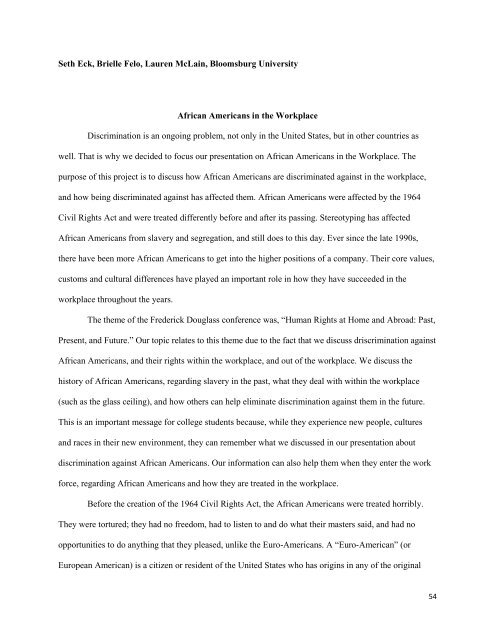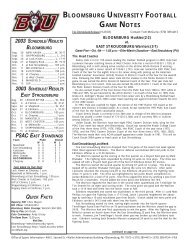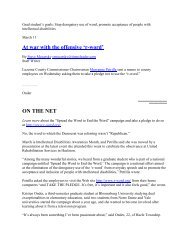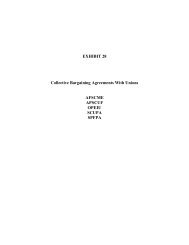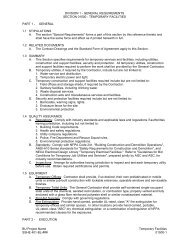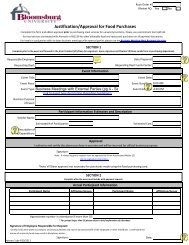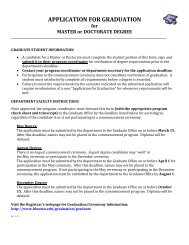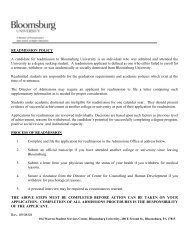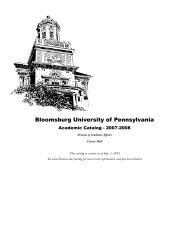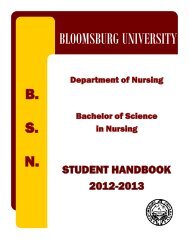Human Rights at Home and Abroad: Past, Present, and Future
Human Rights at Home and Abroad: Past, Present, and Future
Human Rights at Home and Abroad: Past, Present, and Future
You also want an ePaper? Increase the reach of your titles
YUMPU automatically turns print PDFs into web optimized ePapers that Google loves.
Seth Eck, Brielle Felo, Lauren McLain, Bloomsburg University<br />
African Americans in the Workplace<br />
Discrimin<strong>at</strong>ion is an ongoing problem, not only in the United St<strong>at</strong>es, but in other countries as<br />
well. Th<strong>at</strong> is why we decided to focus our present<strong>at</strong>ion on African Americans in the Workplace. The<br />
purpose of this project is to discuss how African Americans are discrimin<strong>at</strong>ed against in the workplace,<br />
<strong>and</strong> how being discrimin<strong>at</strong>ed against has affected them. African Americans were affected by the 1964<br />
Civil <strong>Rights</strong> Act <strong>and</strong> were tre<strong>at</strong>ed differently before <strong>and</strong> after its passing. Stereotyping has affected<br />
African Americans from slavery <strong>and</strong> segreg<strong>at</strong>ion, <strong>and</strong> still does to this day. Ever since the l<strong>at</strong>e 1990s,<br />
there have been more African Americans to get into the higher positions of a company. Their core values,<br />
customs <strong>and</strong> cultural differences have played an important role in how they have succeeded in the<br />
workplace throughout the years.<br />
The theme of the Frederick Douglass conference was, ―<strong>Human</strong> <strong>Rights</strong> <strong>at</strong> <strong>Home</strong> <strong>and</strong> <strong>Abroad</strong>: <strong>Past</strong>,<br />
<strong>Present</strong>, <strong>and</strong> <strong>Future</strong>.‖ Our topic rel<strong>at</strong>es to this theme due to the fact th<strong>at</strong> we discuss driscrimin<strong>at</strong>ion against<br />
African Americans, <strong>and</strong> their rights within the workplace, <strong>and</strong> out of the workplace. We discuss the<br />
history of African Americans, regarding slavery in the past, wh<strong>at</strong> they deal with within the workplace<br />
(such as the glass ceiling), <strong>and</strong> how others can help elimin<strong>at</strong>e discrimin<strong>at</strong>ion against them in the future.<br />
This is an important message for college students because, while they experience new people, cultures<br />
<strong>and</strong> races in their new environment, they can remember wh<strong>at</strong> we discussed in our present<strong>at</strong>ion about<br />
discrimin<strong>at</strong>ion against African Americans. Our inform<strong>at</strong>ion can also help them when they enter the work<br />
force, regarding African Americans <strong>and</strong> how they are tre<strong>at</strong>ed in the workplace.<br />
Before the cre<strong>at</strong>ion of the 1964 Civil <strong>Rights</strong> Act, the African Americans were tre<strong>at</strong>ed horribly.<br />
They were tortured; they had no freedom, had to listen to <strong>and</strong> do wh<strong>at</strong> their masters said, <strong>and</strong> had no<br />
opportunities to do anything th<strong>at</strong> they pleased, unlike the Euro-Americans. A ―Euro-American‖ (or<br />
European American) is a citizen or resident of the United St<strong>at</strong>es who has origins in any of the original<br />
54


